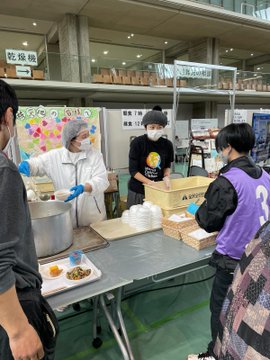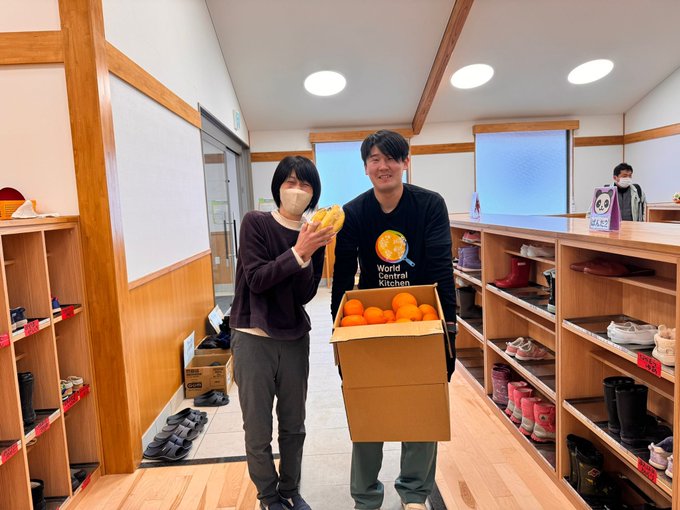How WCK supported Syrians impacted by deadly quakes

WCK’s Relief Team first delivered meals to communities in Syria within days of the February 6 earthquakes that rocked the region. Our team faced a series of challenges new to WCK, none bigger than this being our first response to a natural disaster in a conflict zone. In order to scale operations in the country, we partnered with local restaurants and organizations and have since served millions of nourishing meals to families impacted by the disaster. Sam, WCK’s Director of Emergency Response, was among the first team members to arrive in Syria to establish our operations.
As our response to the earthquakes begins to wind down and operations are transitioned to local organizations, we sat down with Sam to learn more about his experience working in Syria. Read our conversation below.
What was your experience first crossing into Syria?
It was complicated, really, really complicated. I didn’t realize before attempting to work in Syria that you had to cross different borders to get into different regions of the country. Then, once in Syria, we realized that to get from one earthquake-impacted region to another we would have to cross back into Türkiye, drive more than three hours, and cross back into Syria. It was a lot more complicated than I originally thought, but we made it work. I love the WCK way of just going, getting boots on the ground, going to where the problem is, going to ground zero and seeing what you see and figuring it out from there. We had different teams working remotely, teams talking to diplomats, embassies, figuring out how we could get operational in Syria.

I love the WCK way of just going, getting boots on the ground, going to where the problem is, going to ground zero and seeing what you see and figuring it out from there.
Sam
WCK Director of Emergency Response
What was the breakthrough that allowed WCK to start supporting families in Syria?
We were out assessing food needs in Türkiye in the middle of the night shortly after the earthquakes and realized we were only 12 miles from the Syrian border. So we said: “Let’s just go to the border and see what we see.” We got there in the middle of the night and started talking to the border crossing guards. This crossing was one of the main arteries connecting Türkiye and Syria so we asked what vehicles, what logos the guards had seen bringing aid into Syria. They told us they had only seen one logo and that any aid going into Syria was being provided by İHH Humanitarian Relief Foundation. The guard knew someone that worked at İHH. With the guard’s directions, we showed up at the İHH office at 1am and within 10 minutes we were talking to the Foundation’s vice president. And it’s just really interesting, you try to figure things out from afar but nothing beats just going, seeing with your own eyes, talking with people and figuring it out from there.

How were the first WCK-provided hot meals distributed in Syria?
Getting operational in Syria took multiple approaches. We had restaurant partners in Syria—we had different partners inside in different regions. But the single largest kitchen was actually just inside Türkiye, less than a mile from the Syrian border. This huge kitchen owned by İHH allowed us to prepare 40,000 meals a day. It was enough food to fill an 18 wheeler, a full truck of hot meals. These meals were cooked in Türkiye and transported across the border where there were at least 20 smaller trucks waiting. This 18-wheeler would get unloaded, and the food would be quickly dispatched in the smaller trucks to about 80 different distribution sites. WCK has crossed international borders with hot food before, but the complexities of this situation made it a new experience. We were crossing an international border in a disaster zone within a conflict zone. It was happening for a few days before I realized how monumental this was.
You mentioned this being a disaster zone in a conflict zone. How did that impact WCK’s response?
Syria has been heavily affected by conflict for over a decade and is now reeling from the devastating earthquakes. It is a unique, challenging situation. I’ve never worked in a conflict zone—a war zone that’s been impacted by such a large natural disaster. A lot of the people that were affected by the earthquake were people who, within the last 10, 12 years, have been completely displaced, had to flee and leave everything because of war. And then whatever it is that they had rebuilt over the last 10 or 12 years, most of that came crumbling down. I think 80% to 90% of the people who we were serving meals to in Syria were displaced by conflict. To see families that lost everything, rebuilt what they could, and then lost that again was really heartbreaking. I think in such a large, challenging situation, a warm plate of food is hope. It’s saying that you’re not alone. It’s the least we could do, really. And it’s very well received. I think there was a lot of surprise that we were here to support. There was such a relatively small international response to Syria that I think that most of the people we were serving there were incredibly surprised to see us there, to see us there again the next day, and the next day, and the next day.
What were some unique challenges during this response?
The unique challenges of Syria, I think it’s a culmination of a lot of other challenges that we’ve had in either natural disasters or war zones: lack of security, no working financial system, no electricity, no water, no public transportation. Then, you have a natural disaster on top of that. So any bits of infrastructure, markets, things like that also collapsed—it was a complete collapse of everything. It was just about every challenge we’ve had to deal with in other disasters, but all together.
How has the situation in Syria evolved since WCK’s response began?
The situation in Syria from when I first arrived until now, a few months later, things have stabilized a bit. But it’s hard because the war is still going on—it’s been a 12 year crisis. Things have gotten a little bit cleaned up or a little bit more systemized. There’s part of it that’s still completely the same. The fact that there’s no employment, no economy, people are completely displaced. The conflict has been the same since the day after the earthquake until months later. People are cleaning up. A lot of people that had rebuilt some small buildings to live in for who knows how many years, have lost that, and are now moving back into tents. I’d say one difference is that there’s just millions of people, millions of Syrians that are living in this region in tents and have been living in tents for many years. So, a week after the earthquake, tents started showing up. One could look out on these hillsides of just thousands of tents, millions of people living in tents, and you could see which ones were there as a result of the earthquakes because they were new and would stand out amidst all of the old tents. In the beginning, you would see this very drastic difference between tents housing people displaced by the earthquakes and those that were there because of the conflict. Now, a month or two later, it gets dusty and everything starts getting dirty. Now it’s hard to tell the difference between people displaced by the war or the earthquakes, or people that were displaced by the war and then displaced once more by the earthquakes.

What lessons can WCK take away from this response?
I think every WCK response has its own unique set of challenges. We learn off of every single one. Every time we respond to something, we get better. We add another tool to our toolbox. Working in a disaster in a conflict zone is new for us. Working in a disaster in a conflict zone during Ramadan is definitely new to us. I think as we continue to respond to more and more things around the world, having that experience of the war, earthquake, Ramadan is just very unique. But I know it’s also our first time responding to a disaster where Ramadan is a very key part of the culture. It was good to learn. I think we’ll be even better at it next time, which is what we’ve been doing for every disaster. We get better at it and better at it.
What was it like working in Türkiye and Syria during Ramadan?
Being here during Ramadan was really special. I think the flexibility that people have shown in our team, as well as the community around how you feed hundreds of thousands of people a day when you all of a sudden have to change your systems, your timing. It’s a lot of logistics. I was talking to one of the chefs in the İHH kitchen and I asked them: “What’s it like? What are your techniques? How do you cook 40,000 meals a day in one kitchen? You’re working all day cooking 40,000 meals and you’re not eating yourself.” He said, “Well, we only cook recipes that we know are going to taste good. You don’t try to cook something new during Ramadan.” It’s been an honor to experience Ramadan and work shoulder to shoulder with our local contractors and our local partners who are not eating or drinking water all day long and are still serving their communities just as hard as they were before Ramadan.
What do you think this region can teach the rest of the world?
I’ve noticed that the concept of charity is very different here. It’s just a lot more in everybody’s DNA to want to give whether or not it’s tracked or credited or there’s a photo or not. So that’s been really powerful for me. There were millions and millions of people that suddenly needed to eat. And just the spirit of gifting and taking care of each other through food, I think, was really strong here between both Türkiye and Syria.
Do you have any final words on what WCK has learned from this response?
I think it’s just a countless amount of things, whether it’s Ramadan, the way the Turkish people cook. I love the culture. During some responses it can be challenging to find huge pots and pans capable of producing enough food to meet the needs of communities. WCK’s paella pans have to come shipped in from Spain and they’re custom built. Whereas here in Türkiye, you go to almost any kitchen supply store and they have a pot that’s made to feed 1,000 people. And it’s just so cool that it’s such a part of that culture already. So I think there’s been some of the culinary aspects that we’ve learned. Our teams are considering bringing back some Turkish equipment for future responses. We’ve learned the ins and outs of how to conduct an operation of this scale during Ramadan and have learned more about the Muslim culture and how it is that they serve each other. There’s going to be so many takeaways that will be revealing themselves for years to come.
Learn more about our response to the earthquakes in Syria and Türkiye here. Support our work by making a donation here.




